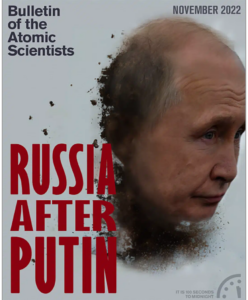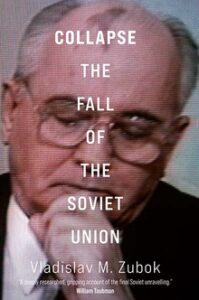 Does Putin really embody what Russia is about? Does a more advanced and stronger Russia always need to be a more aggressive nation against its neighbors? And would Putin’s successor be pursuing the same goals as the current Kremlin ruler? asks Vladislav Zubok, a professor of international history at the London School of Economics and the author of Collapse: The Fall of the Soviet Union (Yale University Press, 2021).
Does Putin really embody what Russia is about? Does a more advanced and stronger Russia always need to be a more aggressive nation against its neighbors? And would Putin’s successor be pursuing the same goals as the current Kremlin ruler? asks Vladislav Zubok, a professor of international history at the London School of Economics and the author of Collapse: The Fall of the Soviet Union (Yale University Press, 2021).
Not necessarily. Rather, when looking back three or even two decades ago, one finds out the opposite was true, he writes:
As the new Russian president, Putin initially cultivated his democratic image, and even said in his electoral manifesto: “History proves all dictatorships, all authoritarian forms of government, are transient. Only democratic systems are lasting.” Yet from the start he seemed to prefer authoritarian methods and viewed himself as Russia’s savior. Early on in his tenure, Putin declared that his goal was to restore Russia’s power and greatness. Putin seemed to even regret the collapse of the Soviet Union, although adding that those “who want to restore it have no brain.”
 The reincarnation of a “new Gorbachev” in the Kremlin would probably be the most appealing prospect for Western liberals and pacifists around the world. Unfortunately, recent Russian history makes such an option highly unlikely, he adds in the Bulletin of the Atomic Scientists.
The reincarnation of a “new Gorbachev” in the Kremlin would probably be the most appealing prospect for Western liberals and pacifists around the world. Unfortunately, recent Russian history makes such an option highly unlikely, he adds in the Bulletin of the Atomic Scientists.
The promise of more sanctions on Russia, denial of entry for Russians to Western countries, a declining standard of living for Russians, huge reparations to be paid to Ukraine, and the prospect of trials and humiliation may look like fair and deserved retribution for the West, Zubok cautions. But for history buffs, it is all too reminiscent of the Treaty of Versailles for Germany in 1919 and, more recently, of the conditions imposed on a defeated Serbia in 1999.







